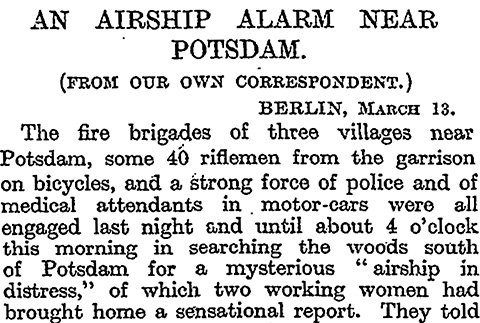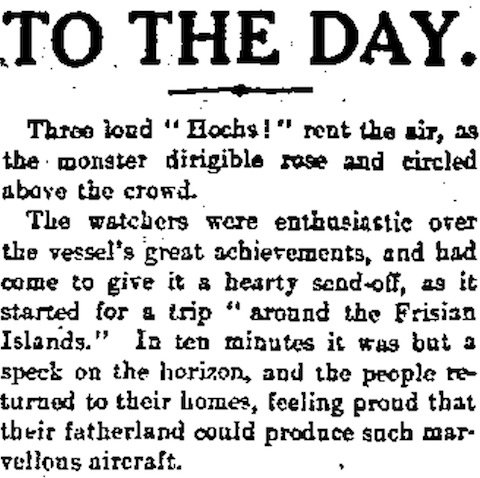
Yesterday’s report of an airship seen crashing in flames near Potsdam in Germany has been picked up by a number of newspapers, including the Aberdeen Daily Journal, the Dundee Courier, the Evening Telegraph, the Liverpool Echo, the Manchester Courier, the Manchester Guardian, the Standard, and the Western Times — most of which don’t say anything new, as they are derived from the same Reuter wire report. However some reports do reveal that the crash occurred near the village of Caputh, and that the the two women who witnessed the apparent disaster ‘saw fire spread from one end of the ship to the other. Then a sudden explosion occurred, wrapping in flame the whole ship, which plunged headlong to the ground’ (Dundee Courier, p. 7). The account provided from The Times‘s own Berlin correspondent has some more details (p. 7; above):
The fire brigades of three villages near Potsdam, some 40 riflemen from the garrison on bicycles, and a strong force of police and of medical attendants were all engaged last night and until about 4 o’clock this morning in searching the woods south of Potsdam for a mysterious ‘airship in distress,’ of which two working women had brought home a sensational report. They told the beadle of their little village that they had seen at 6 o’clock in the evening [of 12 March 1913] an airship first smoking, and then flaming, in the sky. Her forecar had dropped off and had fallen burning into the wood. A few old men of the village were sceptical, but the beadle instantly gave the alarm, with the result that the reinforcements described above soon arrived on the scene. No trace of a car or of its inmates was found, but a small boy brought to the village inn the news that in one spot in the wood there had been a distinct smell of gas. It has turned out that no airship can have been in question, and the most plausible theory is that what was seen — if anything was seen — was the trail of sparks from the motor of an aeroplane. Two military biplanes flew yesterday evening over Potsdam and near the scene of the search.
In fact, it appears that the mystery has been solved already. The Daily Express reports that (p. 1):
Lieutenant Zwickau, a military airman, supplied the explanation this morning. He was flying from Leipzig to Doeberitz and was compelled to fire rockets from time to time to find his way.
Having recent experience of phantom airships, most of the British press probably expected something of the sort; though few went so far as the Liverpool Echo which runs the story under the headline ‘AIRSHIP COMEDY. DISASTER PHANTASY IN GERMANY’ (p. 6).
Many newspapers also report that the Aerial League of the British Empire has issued a manifesto deploring Britain’s defencelessness in the air and demanding that at least £1 million be spent on catching up to France and Germany in military aviation. However, only the Manchester Courier publishes the manifesto in full, which reveals that the first of the Aerial League’s eight points was about the recent mystery airship visits (p. 7):
1. The lesson of the so-called airship ‘scares’ in Yorkshire and elsewhere has been wholly lost upon the country, whose interest has been centred in guessing whether the nocturnal visits of foreign airships were facts or fabrications, and there is no doubt that what is reported to have happened at Sheerness on the admission of one of His Majesty’s Ministers could happen again at any time of the day or night.
The lesson is, of course, that ‘one foreign power alone — Germany — is known to possess at least ten airships, each capable of making flights across the North Sea, of carrying passengers, and of damaging or destroying the nerve centre of our defences’, against which ‘the British Empire possesses the remains of one baby airship and the framework of another’ and, what is worse, ‘we lack the experience which is essential for building large airships of long range and the factories and equipment for the purpose’. The signatories are Plymouth, J. E. C. Welldon, Admiral E. R. Fremantle, Lieutenant-General R. Pole-Carew, Gilbert Parker, Alan H. Burgoyne, Major-General H. T. Arbuthnot, Colonel H. S. Massy, and Stephen A. Harples [sic; actually Marples] as organising secretary.
![]() This work is licensed under a Creative Commons Attribution-NonCommercial-NoDerivatives 4.0 International License.
Permissions beyond the scope of this license may be available at http://airminded.org/copyright/.
This work is licensed under a Creative Commons Attribution-NonCommercial-NoDerivatives 4.0 International License.
Permissions beyond the scope of this license may be available at http://airminded.org/copyright/.


